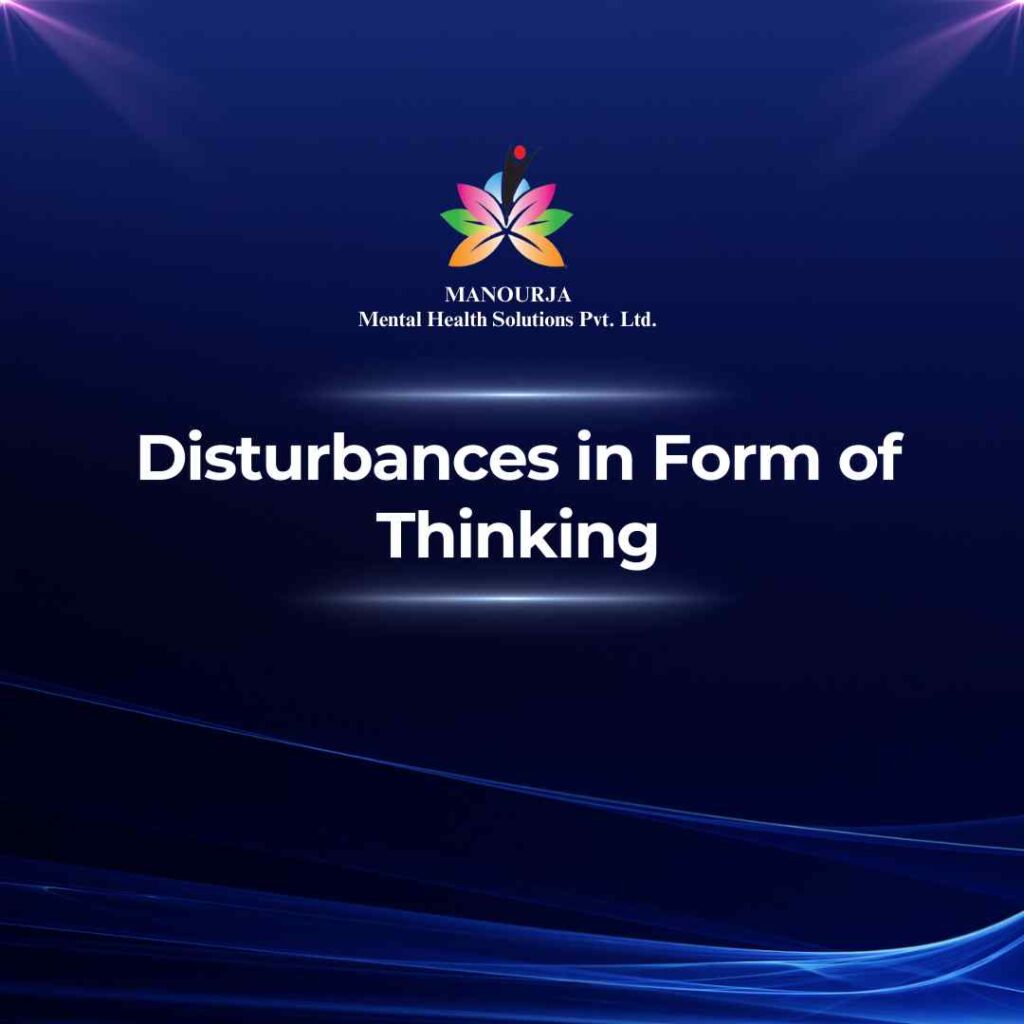Disturbances in the Form of Thinking

Disturbances in the form of thinking refer to abnormalities in the logical organization, coherence, and flow of thoughts. These disturbances impact how thoughts are connected and expressed, rather than what the thoughts are about (which pertains to the content). Such disturbances can significantly impair communication, decision-making, and daily functioning.
Disturbances in the Form of Thinking as a Sign and Symptom of Mental Illness
Disturbances in the form of thinking manifest as various symptoms, including:
- Derailment (Loose Associations): Shifting from one topic to another with little or no logical connection between thoughts.
- Tangentiality: Responding to questions in a way that is obliquely related or completely unrelated to the topic.
- Circumstantiality: Including excessive and unnecessary details in conversation, eventually reaching the main point.
- Flight of Ideas: Rapidly moving from one thought to another, often seen in manic episodes.
- Thought Blocking: Sudden interruption in the flow of thought, where the individual may pause abruptly and be unable to continue.
- Neologisms: Creating new, nonsensical words or phrases that have meaning only to the individual.
- Clang Associations: Choosing words based on their sound rather than their meaning, often rhyming or punning.
- Incoherence (Word Salad): Severe disorganization of speech, making it nearly impossible to understand.
Mental Illnesses Where These Disturbances Are Present
Schizophrenia is a severe mental disorder characterized by profound disruptions in both the form and content of thought. Individuals may exhibit derailment, incoherence, tangentiality, and neologisms, making their speech difficult to follow.
During manic episodes, individuals with Bipolar Disorder may experience flight of ideas, where thoughts race and shift rapidly, making speech rapid and disjointed. Thought blocking can also occur during depressive episodes.
Schizoaffective Disorder presents symptoms of both schizophrenia and mood disorders (bipolar or depression). Disturbances in the form of thinking, such as derailment and incoherence, are common alongside mood-related symptoms.
- Major Depressive Disorder with Psychotic Features
In severe cases of Major Depressive Disorder, particularly with psychotic features, individuals may experience thought blocking and circumstantiality due to intense negative thought processes and cognitive impairment.
Individuals with OCD may exhibit circumstantiality as they become preoccupied with intrusive thoughts and compulsions, leading to excessive detail in their speech and actions.
People with ASD may sometimes display tangentiality and circumstantiality due to challenges in social communication and an intense focus on specific topics.
- Substance-Induced Psychotic Disorder
Substance abuse, particularly with stimulants or hallucinogens, can lead to disturbances in thought form such as derailment, incoherence, and flight of ideas during intoxication or withdrawal phases.
Delirium is an acute, often sudden onset of confusion and disorganized thinking, frequently resulting from a medical condition, substance intoxication, or withdrawal. It can involve incoherence and tangentiality.
Conclusion
Disturbances in the form of thinking are significant indicators of various mental health disorders. Recognizing these disturbances is crucial for accurate diagnosis and effective treatment, helping individuals manage their symptoms and improve their overall functioning and quality of life.
At MANOURJA, we believe in the transformative power of counseling. Our experienced therapists offer a safe and supportive space where you can explore your thoughts, emotions, and challenges. Through personalized counselling sessions, we’ll work together to develop coping strategies, build resilience, and achieve lasting positive change. Discover the path to a healthier, happier you with MANOURJA counselling services.
MANOURJA Rehabilitation Services
At MANOURJA, we’re dedicated to helping you in rebuild your life, after difficult times. Our rehabilitation services focus on understanding what you need to move forward, whether you’re recovering from addiction, trauma, or any psychological – social challenges. We create personalized plans, that are all about helping you, regain your strength and find hope again. With a caring team by your side, you’ll have the support to make real progress and take steps toward a brighter, healthier future.
